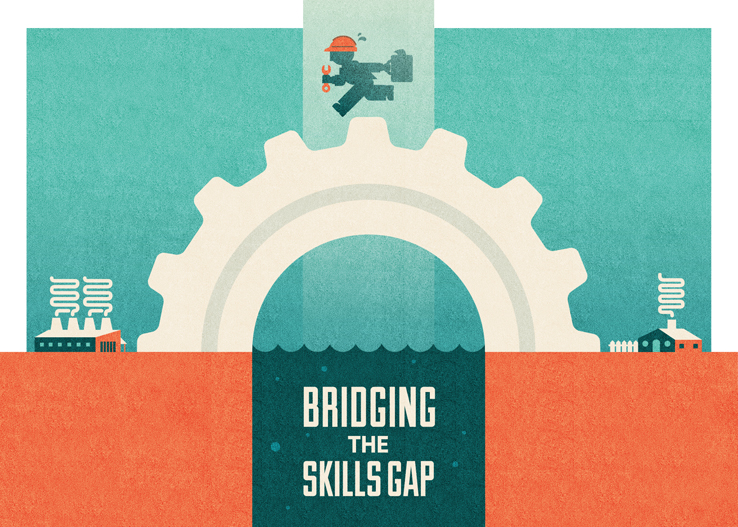Is It Okay Not To Be College Ready? #TrumpEducation Says Yes.

Photo Credit: Bridging the skills gap: Vocational training takes center stage

This post takes a closer look at one of the areas: "College Readiness," that I shared in my post about What a #TrumpEducation Means...More or Less.
As any educator, parent, or student over the past decade is aware, the Obama administration laid out standards and assessments that required all students to be college AND career ready. Like it or not, college readiness was thrust upon all citizens. Those who felt college wasn't the path for them, were looked upon as "less than" and if they were unable to attain employment, well, that was their fault.
The problem in doing this, among other things, is that it alienated a large demographic in our country who has lost hope and who Trump has promised to help.
David Frum writes in the current issue of The Atlantic explains that as a result "The angriest and most pessimistic people in America are the people we used to call Middle Americans." "Middle-class and middle-aged; not rich and not poor; people who are irked when asked to press 1 for English and who wonder how white male became an accusation rather than a description. They are pissed off. And when Donald Trump came along, they were the people who told the pollsters, 'That's my guy.” “You can measure their pessimism in polls that ask about their expectations for their lives—and for those of their children. On both counts, whites without a college degree express the bleakest view. You can see the effects of their despair in the new statistics describing horrifying rates of suicide and substance-abuse fatality among this same group, in middle age.”The #TrumpEducation platform seems to lay out a plan acknowledging that rather than one path to success there will be a focus on careers which can be attained via a number of pathways.
Mike Rowe explains it this way: “The kind of recovery that Donald Trump is promising will require a workforce that’s properly trained and sufficiently enthused about the opportunities at hand. At the moment, we do not have that workforce in place. What we do have, are tens of millions of capable people who have simply stopped looking for work, and millions of available jobs that no one aspires to do. That’s the skills gap, and it’s gotta close.” Rowe has offered to assist in any attempt to reinvigorate the skilled trades, and shine a light on millions of good jobs that no one seems excited about pursuing.
It may also mean looking to models like that which have been adopted in places like Germany where school studies are aligned to career possibilities. Take a look at the one minute video below to see how that plays out.
Tools and ideas to transform education. Sign up below.
Vice president-elect Mike Pence understands the issue as was shared in Chalkbeat Indiana where he said that he believes we are too focused on trying to prepare all children for college and have let slip programs that prepared high school graduates to go directly to work in good paying jobs that did not necessarily require college. In his state of Indiana he put into place a bill that creates regional Works Councils that work with the private sector and educational organizations to identify needs in the area’s workforce, create partnerships between schools and businesses for internships and apprenticeships and boost career and vocational ed in high schools.
Models that embraced student's passions, talents, interests, and abilities fell out of favor in the standards and testing fervor. In a Trump administration models like these could indeed become great again. Internships and apprenticeships that have faded away in current times are likely resurface with a president well-known for being TV boss of "The Apprentice." For elementary and middle school we may see more Schoolwide Enrichment Models where the focus is students discovering and developing their passions, talents, and interests in partnership with community organizations. Students at such schools know where their talents lie and by the time they are in secondary school they are ready to think about and try on possibilities for their future. This means we may return to a time where internships and apprenticeships are valued. This is embedded in Big Picture Learning where all students work while in secondary school during the school day.
In Israel, the military is what makes them a country with one of the world's lowest rates of youth unemployment. But even if you think Military readiness for all is also a mistake, Saul Singer author of StartUp Nation shared some alternatives. He explained it is essential that we challenge youth in situations where taking charge is a must, results really matter, and they are doing work that requires them to see the world as bigger than themselves.
Saul asks: What if all teens had to do something that helps their country and their communities? What if? If you talk to teens and ask them if they would rather spend every day in a classroom, or if they would prefer to do their part to help others, improve communities, and make a difference through meaningful work, most would choose the latter.
Why are we stopping them?
Lisa Nielsen writes for and speaks to audiences across the globe about learning innovatively and is frequently covered by local and national media for her views on “Passion (not data) Driven Learning,” "Thinking Outside the Ban" to harness the power of technology for learning, and using the power of social media to provide a voice to educators and students. Ms. Nielsen has worked for more than a decade in various capacities to support learning in real and innovative ways that will prepare students for success. In addition to her award-winning blog, The Innovative Educator, Ms. Nielsen’s writing is featured in places such as Huffington Post, Tech & Learning, ISTE Connects, ASCD Wholechild, MindShift, Leading & Learning, The Unplugged Mom, and is the author the book Teaching Generation Text.
Disclaimer: The information shared here is strictly that of the author and does not reflect the opinions or endorsement of her employer.
Lisa Nielsen (@InnovativeEdu) has worked as a public-school educator and administrator since 1997. She is a prolific writer best known for her award-winning blog, The Innovative Educator. Nielsen is the author of several books and her writing has been featured in media outlets such as The New York Times, The Wall Street Journal, and Tech & Learning.
Disclaimer: The information shared here is strictly that of the author and does not reflect the opinions or endorsement of her employer.
